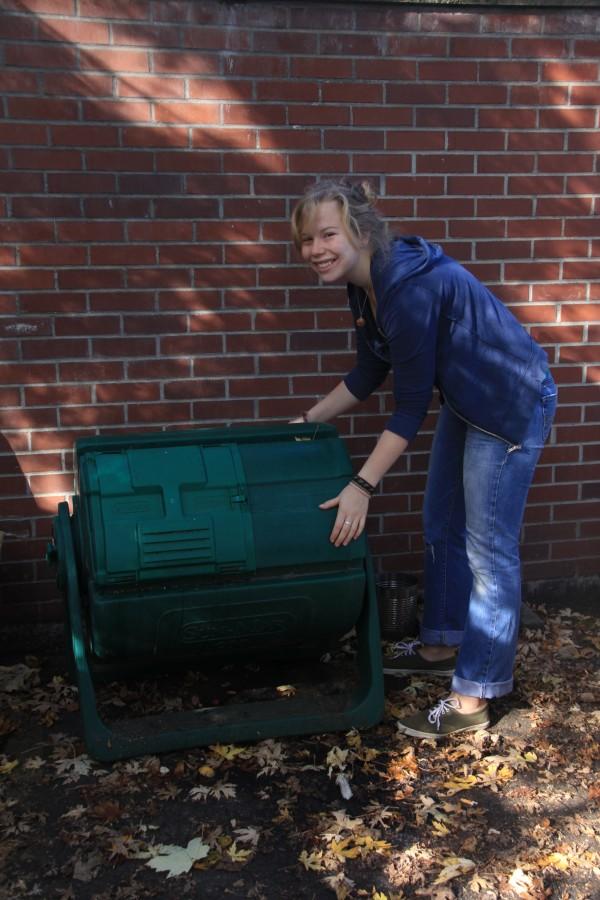With so much food often placed on our plates, it is easy to be unaware of where it all eventually ends up. According to an article in the New Scientist on July 31, sixteen percent of the energy consumed in the United States is used to produce food, yet at least 25 percent of food is wasted each year.
Colleges and universities nationwide are working to change this waste cycle by implementing systems to compost their food waste.
Although the Whitman Organic Garden has long had its own composting system, this fall, Whitman established its first all-campus system. Each residence hall section has a composting container that students empty into tumblers located behind Anderson and Jewett Halls. The program aims to not only reduce food waste within the residence halls, but to also educate students on maintaining a sustainable environment.
Marshall University in Huntington, W. Va. has also enacted a new composting system. However, unlike Whitman’s program, Marshall composts food waste produced within its central cafeteria. Student workers employed by the Sustainability Department assist with emptying the bins.
Senior Patrick Murphy, Marshall’s student body president, has high hopes for the program.
“I hope the composting program will continue because I hope it’s not something just a couple of people want to do. It’s a good thing for the university,” he said.
Students and administration at Marshall have also responded positively to the program.
“They’re really for it. There are a lot of groups on campus that are happy that they started it, and I get a good reaction from the administration,” Murphy said.
Senior Ari Frink, Whitman’s campus sustainability coordinator, hopes that as a result of the positive response towards the college’s new composting system, the program as well as support for more advanced and large-scale composting projects on campus will continue to grow.
“The administration is very supportive of the composting program,” said Frink. “The President is very interested in industrial composting; and if the President is interested, then there is will [behind] it.”
Since the start of the semester, Jed Schwendiman, associate to the President, has twice met with students to discuss President Bridges’ interest in composting. Like Frink, Schwendiman actively encourages students to research different options for expanding on-campus composting and to present these to the college. Students involved in the composting program are looking into industrial composting, which would allow the school to compost food on a large scale, thus facilitating the expansion of the current program.
Portland State University also recently initiated a new composting program. Although many major cities along the West Coast such as Seattle and San Fransisco have residential pick-up composting programs and contracts in place, Portland has yet to create a composting program that is open to the public.
Honoré Depew, education and outreach specialist for PSU Recycles!, hopes that the program will encourage Portland State University to reduce its amount of food waste by supporting a city-wide composting program.
“The PSU compost station is just the first step to introduce composting to the public,” said Depew. “This is the beginning of reducing our climate footprint.”
Portland has implemented a pilot program of 2,000 households to assess the city’s reaction towards composting and it is expected to be expanded city-wide sometime early next year. Although it is difficult to gauge public reaction, Depew hopes that the city program will be supported.
Similarly, students behind the composting program at Whitman hope that the new program will encourage Walla Walla to implement a city-wide composting pick-up program. While one does not currently exist, in 2007 the city created a compost facility available to the public. Although the facility helps to divert food waste from landfills, people looking to compost their food and yard waste must bring it to the compost facility and pay a fee; compost created at the facility is then sold back to citizens who use it for various needs.
Junior Katie Radosevic, who has been working with other students on the composting program, hopes that her efforts will inspire the community to expand Walla Walla’s current composting system.
“Hopefully, it will show to Walla Walla that we can succeed in composting,” she said.
Professor of Biology Heidi Dobson believes that the key to maintaining a strong composting program and encouraging the public to embrace composting is a combination of an efficient, user-friendly infrastructure, public awareness and effective education.
“You need active participation, you need educated people, and [you need] collective organization so that all compostable material is collected efficiently,” she said.
Over in Portland, Depew hopes that by keeping students at PSU informed and the public motivated, the program will continue to grow and encourage future generations of students to actively participate in composting.
“It’s a shift for people to realize that composting makes sense, but it’s crucial for people to look at composting and recycling as a resource,” he said.
First-year Phoebe Horvath, who is involved with organizing the composting system on campus, agrees that the amount of people in favor of an environmentally-friendly campus is growing.
“Composting is another way to be sustainable. It seems like people our age are moving more towards a sustainable society. The administration also sees it as a moral good and a money-wise saving,” she said.
An informational meeting for anyone interested in expanding the composting at Whitman will be held this Friday, Oct. 15 in Reid 240 at 1 P.M.





